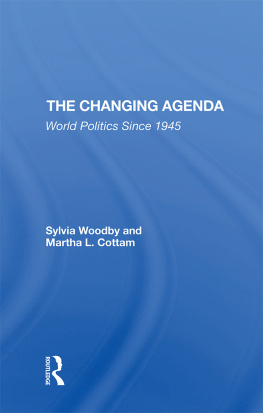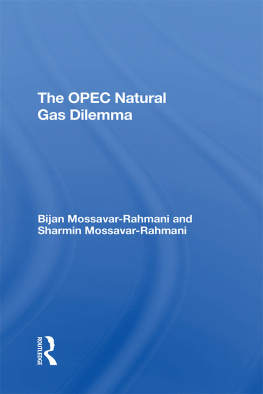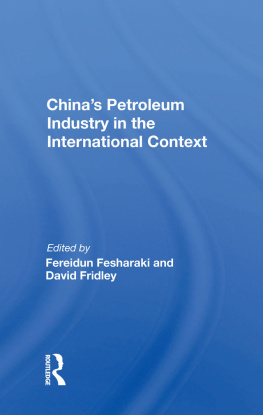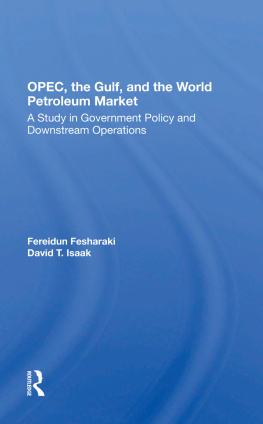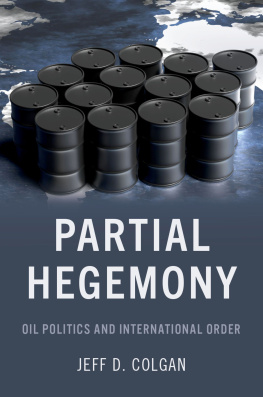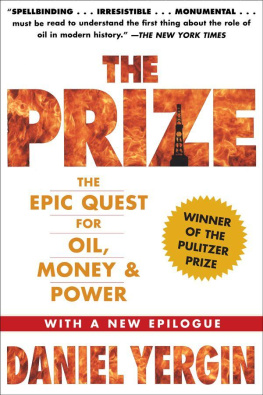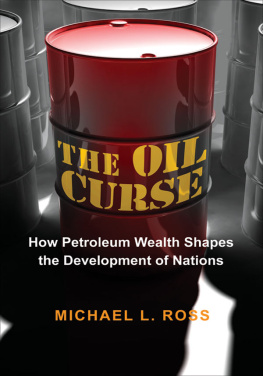OPEC
The Rise and Fall
of an Exclusive Club
OPEC
The Rise and Fall
of an Exclusive Club
Shukri Ghanem
We have formed a very exclusive Club we are now united we are making history
Perez Alfonzo
First published in 1986 by KPI Limited
Published 2016 by Routledge
2 Park Square, Milton Park, Abingdon, Oxon OX14 4RN
711 Third Avenue, New York, NY 10017, USA
Routledge is an imprint of the Taylor & Francis Group, an informa business
Distributed by
Routledge & Kegan Paul, Associated Book Publishers (UK) Ltd.
11 New Fetter Lane, London EC4P 4EE
Produced by Worts-Power Associates
Set in Times
by Illustrated Arts Limited, Sutton, Surrey
Shukri M. Ghanem 1986
No part of this book may be reproduced in any form without permission from the publisher, except for the quotation of brief passages in criticism.
ISBN 13: 978-0-7103-0175-8 (hbk)
Contents
The National Academy for Scientific Research offered me a years sabbatical leave from my job as the Institutes Chief Economist. This coincided with an invitation from the School of Oriental and African Studies at the University of London to spend a year with them as an academic visitor. I accepted both offers and took the opportunity to write this book. Im sure that this task would have been virtually impossible without the generosity of both these institutions.
My special thanks are due to Dr K. S. McLachlan whose help, encouragement and advice have at all times been invaluable; and, to Dr Christopher Eaglen I extend my deep appreciation for his understanding and ever-ready and unstinting advice.
My thanks are due also to Dr Mousa Omar, Dr Ali Benlashhar, Mr Milad Larady, Dr Mukhtar Buru, Salah Hajjaj, Nahati Lameer, Hisham El Solh, Mrs Lata Patel and Mrs Baker.
In compiling data and statistics I used a number of resources, the most important were OPEC Statistics, specifically OPEC Annual Statistical Reviews, the OAPEC Statistics, the Annual Reports of the Secretary General of OAPEC and the International Energy Agency and Annual Reports.
The shortcomings remain, of course, always mine.
To my wife Najat and my children, Mohammed, Ghada, Nahla and Aya for allowing me, albeit reluctantly, to use the time I should have spent with them in writing this book.
Oil has been known to exist since the time of the ancient Pharoahs, Babylonia and Byzantium. It seeped from the earth in Persia, Iraq, Indonesia and other parts of the world. Since it was discovered it has been used in medicine and witchcraft; and in some places it created huge fires which people worshipped. Oil uses were different but limited, and by the middle of the last century a few street lamps in Bucharest were lit by oil extracted from coal.
The properties of oil showed that it possesses definite advantages over other sources of energy, mainly coal, but meagre supplies a result of the high cost and limited quantities of oil produced either from coal or from whale blubber restricted its uses and prevented any possible expansion of the market, despite the growing demand. Yet theories started to develop that oil is available beneath the surface of the earth, and business people began to believe that, if a way could be found to extract it, there would be a big and expanding market for it.
The real start of the modern oil industry began by the application of those theories when Colonel Edwin Drake proved that oil does exist beneath the earths crust. Drake discovered the first underground oil near Titusville in Pennsylvania on 27 August 1859 after drilling a well 70 feet deep. Drakes well produced about 30 barrels a day. Although the main use of oil at that time was for lamp lighting, it did not take long to discover the internal combustion engine which opened new opportunities for the use of oil and its products. The expansion of the market was both quick and sudden as oil became the fuel for railways, ships and electrical generators. Consequently the demand increased rapidly, and oil companies were quickly formed and no effort spared to find new oil sources and produce more oil to meet the growing market.
Yet the problems of oil production since the early days of the industry have always been the high sums of money needed for investment, the need for using the latest technology and the high risk and uncertainty involved mainly in the exploration phase.
Companies started growing big very quickly. John D. Rockefeller saw the importance and the great future of this industry, but he also saw that the best way to control the industry was through the ownership of the refining industry. He called the refineries the Gibraltar of the industry. Since the exploration for crude oil carries a greater risk than the supply of its products, he saw that refining was less risky than crude oil production. If he could control the refineries, he would automatically control the demand for crude oil and crude oil products, since the producers could not go to the consumer without going through the refiners and the suppliers of products to consumers. Similarly, consumers could not go to the suppliers of crude oil direct without having first gone through him.
Rockefeller established Standard Oil Trust in 1870 with a capital of $2.5 million, with the aim of controlling the oil market in America. In fact, it did not take him long before he achieved his aim. By 1879, his company owned 90 per cent of the US oil refining industry and established an effective monopoly on the products market and an effective monopoly in the crude oil market. He also directed his attention to the transportation business and since 1877, hardly a barrel of oil could get to a railroad without his consent whoever it belonged to (Federal Trade Commission 1952: p.38). In 1882 he established the Standard Oil Trust, controlling 95 per cent of the refining capacity in the US. By 1904 the Trust controlled 40,000 miles of pipeline in the US, while all other companies together had only 550 miles of pipeline (Succari 1968: p.55). Standard Oil Trust functioned only until 1911 when the Supreme Court ruled it illegal and in violation of the antitrust act of 1899 known as the Sherman Act. The Trust was divided into more than thirty companies, among them the Standard Oil Company of New Jersey, now Exxon, Standard Oil of California, Standard Oil of New York, now Mobil, Standard Oil of Indiana and Continental Oil Company.
The Standard Oil Trust dominated the petroleum market and the petroleum transportation facilities not only in the United States but also internationally.
The first real competitive effort came from the Russians. Oil was discovered there and developed, mainly by the Nobel brothers, in the 1870s, and by 1883 Russian production reached 50,000 barrels a day. Russian oil was selling not only in Europe but also in the Far East.
In 1907 Shell and the Royal Dutch Oil Company were amalgamated, and the Shell Royal Dutch Company was established with oil coming from Russia, Indonesia and some European countries. Shell sought foreign oil, not only in Europe and Asia, but also in Latin America where it was produced in Mexico and Venezuela.
Mexico was quickly developed as an oil producer after oil was discovered early in the century by a British engineer and an American oilman. In 1914, Shell became a producer of oil from Mexico. By 1921 Mexican production had exceeded 200 million barrels.



